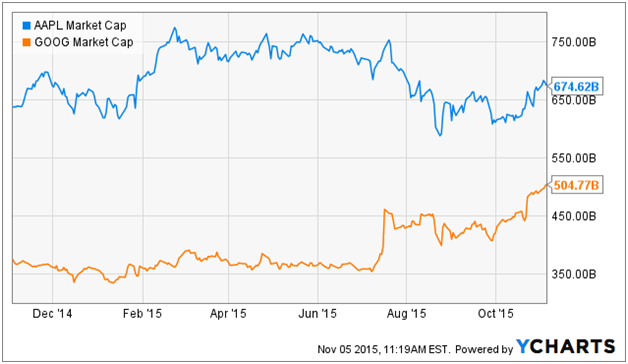Technology giants Apple (AAPL ) and Alphabet (GOOG) are two of the biggest companies in the world. Due to their popular products and high revenue growth, each company has demonstrated rapid earnings growth over the past several years. This has resulted in significant stock price appreciation for both, and thus higher market capitalizations (since market capitalization is a function of stock price and the number of shares outstanding).

A company’s market capitalization increases from a combination of a rising stock price and an increase in the number of shares outstanding. Stock prices typically rise from an underlying growth in earnings per share as well as an increase in the valuation multiple investors are willing to pay for those earnings. For example, Apple’s current market capitalization is $675 billion; this is the result of its $120 per share stock price and its 5.6 billion shares outstanding.
Now, the question is which of the two will hit a $1 trillion of market capitalization first?
Why Share Repurchases Are So Important
Both Apple and Alphabet return a great deal of cash to shareholders each year. This is an advantage of their massive free cash flow generation. Apple and Alphabet are highly profitable and maintain fairly low capital expenditures; this results in significant free cash flow. For example, Apple generated $70 billion of free cash flow in fiscal 2015, while Alphabet produced $11.7 billion of free cash flow over the first nine months of fiscal 2015.
Since neither company has a large debt load, this free cash flow is accumulating on the balance sheet. Apple and Alphabet now have $205 billion and $72 billion, respectively, in cash, short-term, and long-term marketable securities on their balance sheets. This is what allows both companies to return cash to shareholders, mostly through share buybacks. Apple in particular devotes a great deal of cash flow to buying back stock. Just last year, the company utilized $35 billion to do so. Apple has been the target of activist investors like Carl Icahn, who urged the company to aggressively repurchase more stock since they have such a huge amount of cash sitting idle on the balance sheet.
Going forward, their share buyback programs will have a significant impact on whether they eventually reach $1 trillion in market equity value. The reason is that when companies buy back their own stock, it reduces the remaining shares outstanding. From then on, each remaining share captures a higher portion of the company’s profits, otherwise known as earnings per share. Fewer shares outstanding typically results in higher earnings per share, which then leads to a higher stock price and market capitalization.
How Each Stock Gets to $1 Trillion
In order to reach $1 trillion in market capitalization, both Apple and Alphabet will need to meaningfully grow earnings per share. Their earnings multiples are also important as the stocks will need to maintain similar P/E ratios to where they are now in order to see their stock prices rise over time. In order to project future earnings growth, let’s use average earnings growth over the past five years for each company. All data for these calculations was taken from Apple’s and Alphabet’s 10-K filings with the SEC.
Apple and Alphabet have each increased earnings per share by 18% and 10%, respectively, per year over the past five years. The other assumption being made is how many shares will be repurchased by each company. Again, let’s use their five-year historical repurchase activity as a baseline estimate. Apple has reduced its share count by 2% each year in the past five years, while Alphabet has repurchased 1% of its shares over this time.
Assuming reasonable earnings growth rates and P/E ratios, as well as realistic stock repurchases, it is possible to project future market capitalizations for both stocks in the following table.
| Apple | ||
|---|---|---|
| 2016 EPS | $10.88 | $28.94 |
| 2017 EPS | $12.83 | $31.83 |
| 2018 EPS | $15.15 | $35.02 |
| Estimated P/E Multiple | 13 | 30 |
| 2018 Stock Price | $197 | $1,050 |
| 2018 Shares Outstanding | 5.6 Billion | 666 Million |
| 2018 Market Capitalization | $1.1 Trillion | $700 Billion |
Why Apple Will Likely Hit the $1 Trillion Mark First
Apple and Alphabet are both high-growth companies with very strong brands and profitable business models. As a result, it seems likely both companies will, at some point, reach $1 trillion in market capitalization. But based on its stronger growth and the fact that it is already much closer to a $1 trillion valuation, Apple is probably going to reach the target before Alphabet. Despite the fact that Alphabet stock has enjoyed a higher P/E multiple in recent years, which helps provide a higher stock price, Apple has grown earnings at a faster rate over the past several years.
Apple’s flagship iPhone propelled significant earnings growth. Further, the company’s plan to release new versions of the iPhone each year, along with new products like a new Apple TV, a rumored Apple television, and continued growth in services, should provide room for double-digit earnings growth going forward. Alphabet is also growing earnings at a solid rate, thanks to its core search business. It has many potential growth catalysts, including Nest and self-driving cars, but these products are still years away from having a material impact on the company’s earnings.
As a result, it is likely Apple will continue to grow earnings at a higher rate than Alphabet. Moreover, Apple already has a significant lead as its current market capitalization is much higher than Alphabet. Due to these factors, Apple will likely be the first company to reach the $1 trillion market capitalization.
Disclosure: The author is long AAPL.





